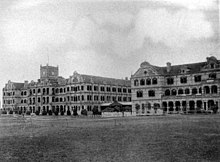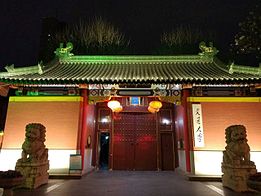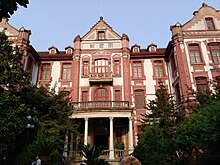Shanghai Jiao Tong University
上海交通大学 | |||||||||
 | |||||||||
Former names |
| ||||||||
|---|---|---|---|---|---|---|---|---|---|
| Motto | |||||||||
Motto in English | Gratitude and Responsibility[2] | ||||||||
| Type | Public | ||||||||
| Established | 1896 | ||||||||
| President | Ding Kuiling[3] | ||||||||
| Party Secretary | Yang Zhenbin | ||||||||
Academic staff | 3,061[4] | ||||||||
| Undergraduates | 16,221[5] | ||||||||
| Postgraduates | 21,768[6] | ||||||||
| Location | , 31°12′03″N 121°25′47″E / 31.20083°N 121.42972°E | ||||||||
| Campus | 340 hectares (840 acres) | ||||||||
| Affiliations | C9, Universitas 21, Double First-Class Construction Project 985, Project 211 | ||||||||
| Website | |||||||||
| Chinese name | |||||||||
| Simplified Chinese | 上海交通大学 | ||||||||
| Traditional Chinese | 上海交通大學 | ||||||||
| |||||||||
Shanghai Jiao Tong University (SJTU) is a public university in Shanghai, China. It is affiliated with the Ministry of Education of China. The university is part of Project 211, Project 985, and the Double First-Class Construction.[7] It is a member of the C9 League.[8]
SJTU was founded as Nanyang Public School in 1896. It was merged into Jiao Tong University in 1921, before gaining its current name in 1959. The university currently has 33 schools, 12 affiliated hospitals, 2 affiliated medical research institutes, 23 directly affiliated units, and 5 directly affiliated enterprises.[9]
History
[edit]Public school to industrial school
[edit]
Nanyang Public School was founded in 1896, making it one of the earliest universities in China. Sheng Xuanhuai requested the Qing government open the school in October. The proposal was approved by the Guangxu Emperor in December, and Sheng became the school's first president.[10] As a member of Westernization Movement, Sheng aimed to weaken the imperial examination while promoting a Western academic model and a more practical approach to education. The university initially focused on business and political sciences to support the country's development and the Self-Strengthening Movement.[11]
In 1905, Nanyang Public School was transferred to the Ministry of Commerce and renamed High Industrial School. In 1907, it was handed to the Ministry of Posts and Communications and renamed Shanghai High Industrial School of the Postal Transmission Department. It was known as Grand Nanyang University from 1911 to 1912. After the Republic of China was established in 1912, it was transferred to the Ministry of Communications and renamed the Shanghai Special Industrial School.[11][12]

Tang Wenzhi was the school's president from 1907 to 1920. During this period, the school organized its curriculum based on Western engineering higher education. The school expanded its civil, mechanical, and electrical engineering programs and introduced a 4-year traffic management program as well as new industrial economy and factory management courses. Moreover, specialized coursework replaced general education requirements, and experiments and practice were prioritized in the curriculum.[11]
From 1908 to 1920, foreign instructors, largely Americans, accounted for about half of the school's faculty in the disciplinary specialities, with American academics leading both the Departments of Civil Engineering and Electrical Engineering, as the university lacked qualified faculty. However, in the 1920s, many returned student-educators replaced their foreign counterparts.[11]
Post-1949 developments
[edit]
On May 25, 1949, the People's Liberation Army (PLA) captured the western part of Shanghai, allowing Jiao Tong University to gradually resume operations. Classes restarted on June 2, and on June 15, the Shanghai Military Commission officially assumed control of the university.[13] On August 20 of that year, Jinan University's Science College merged into Jiao Tong University, with students relocating to the campus by September 9. Following the establishment of the People's Republic of China, Jiao Tong University introduced new majors in December 1950, including automotive engineering, highway management, construction equipment, and civil engineering. On March 1, 1951, the Department of Telecommunication Management was renamed the Department of Telecommunication Engineering Management.[14] By July 28, 1952, the university's faculties were reorganized into three main areas: Mechanical Engineering, Electrical Engineering, and Shipbuilding. Subsequently, on August 21, the Mechanical Engineering department from the former East China Traffic College was integrated into Jiao Tong University.[15]
On December 25, 1954, Peng Kang, the university's Party Secretary, announced the adoption of the presidential responsibility system.[16] On January 7, 1955, the university expanded its Shipbuilding College under the direct leadership of the Ministry of First Mechanical Industry. Faculty and students from the Dalian Institute of Technology's shipbuilding department joined Jiao Tong University between January 29–30. On June 22, 1955, the academic structure transitioned from a two-year specialization to a five-year degree program, and the two-year program was phased out by July. By June 29, the university's telecommunication and automotive programs were transferred to Chengdu and Changchun, respectively.[17][18][19]
On March 13, 1956, Jiao Tong University initiated discussions to enroll its first cohort of graduate students in fields like mechanical engineering, metallurgy, and electrification. This pilot program evolved, and by 1958, the university had grown to include 6 departments and 15 majors, with 5,000 students at that time. In March 1958, the Shanghai Shipbuilding Institute and Nanyang College of Technology officially merged with Jiao Tong University.[20]
Relocation and splitting up
[edit]
During a May 24–25, 1955 meeting, Jiao Tong University's committee decided to follow central government instructions to relocate the university. On August 20, an office was established in Xi'an to begin preparations, and the relocation plan was announced on November 24. In January 1956, a delegation was sent to inspect the Xi'an site. The relocation began in earnest by 1957, with the Shanghai Municipal Party Committee agreeing to the move on June 22. However, just a week later, the university decided to operate campuses in both Shanghai and Xi'an, with only select departments relocating.[21] In September, many Civil Engineering faculty and students transferred to the Xi'an campus, which was formally separated into Xi'an Jiaotong University on July 31, 1959, with the Shanghai campus renamed Shanghai Jiaotong University.[22][23]
Period of Shanghai Jiao Tong University
[edit]
In 1961, Shanghai Jiaotong University came under the dual leadership of the National Defense Science and Technology Commission (NDSC), the Ministry of Education, and the Shanghai Municipal Party Committee.[24] On June 10, the Minyan Road branch campus was handed over to Shanghai Institute of Technology, and by January 10, 1962, the preparatory department followed. On August 29, 1962, Shanghai Jiaotong University was restructured into 8 departments including Shipbuilding, Radio Engineering, and Electrical Engineering. In 1970, SJTU was placed under the Sixth Ministry of Machinery Industry's leadership. In 1978, the university re-established departments in Applied Mathematics, Applied Physics, and Engineering Mechanics, followed by the reconstruction of the Department of Civil Engineering in 1985. The Minhang Campus was officially opened in 1987.[25] In 1999, Shanghai Agricultural College merged into SJTU.[26] In 2005, the former Shanghai Jiao Tong University and the former Shanghai Second Medical University (上海第二医科大学) merged to establish the new Shanghai Jiao Tong University.[27][28]
In 2024, five Shanghai Jiao Tong University students who participated in an exchange program with the University of Michigan were charged with espionage-related offenses after being caught during exercises at Camp Grayling which included Taiwanese forces.[29] In January 2025, the University of Michigan ended its partnership with Shanghai Jiao Tong University.[30]
Rankings
[edit]| BCUR National[31] | Domestic | 4 | |
|---|---|---|---|
| Wu Shulian National[32] | Domestic | 4 | |
| CUAA National[33] | Alumni | 5 | |
| QS National[34] | General | 5 | |
| THE National[35] | General | 5 | |
| QS Asia (Asia version)[36] | General | 14 | |
| THE Asia (Asia version)[37] | General | 7 | |
| ARWU World[38] | Research | 38 | |
| QS World[39] | General | 45 | |
| THE World[40] | General | 52 | |
| USNWR World[41] | General | 54 | |
Subject rankings
[edit]
|
| |||||||||||||||||||||||||||||||||||||||||||||||||||||||||||||||||||||||||||||||||||||||||||||||||||||||||||||||||||||||||||||||||||||||||||||||||||||||||||||||||||||||||||||||||||||||||||||||||||||||||||||||||||||||||||||||||||||||||||||||||||||||||||||||||||||||||||||||||||||||||||||||||||||||||||||||||||||||||||||||||||||||
Notable alumni
[edit]This section needs expansion. You can help by adding to it. (January 2024) |
See also
[edit]- National Chiao Tung University
- Beijing Jiaotong University
- Xi'an Jiaotong University
- Southwest Jiaotong University
References
[edit]- ^ 校训. Archived from the original on March 17, 2018. Retrieved July 10, 2014.
- ^ "SJTU 2011 Undergraduate Commencement Ceremony". June 25, 2011. Archived from the original on December 20, 2016.
- ^ "Current Administrators". Shanghai Jiao Tong University. Archived from the original on February 18, 2024. Retrieved February 17, 2024.
- ^ "Antai College of Economics & Management Shanghai JIao Tong University-Projects". emba.sjtu.edu.cn. Retrieved September 7, 2021.
- ^ "2017–12-31 Overview (Undergraduate)" (PDF). Shanghai Jiao Tong University. Archived (PDF) from the original on February 28, 2020. Retrieved June 10, 2019.
- ^ "2017–12-31 Overview (Postgraduate)". Shanghai Jiao Tong University. Archived from the original on March 27, 2019. Retrieved June 10, 2019.
- ^ 教育部 财政部 国家发展改革委 关于公布世界一流大学和一流学科建设高校及建设 学科名单的通知 (Notice from the Ministry of Education and other national governmental departments announcing the list of double first-class universities and disciplines). Archived from the original on March 27, 2019. Retrieved June 19, 2018.
- ^ Yang, Rui; Xie, Meng (March 1, 2015). "Leaning toward the Centers: International Networking at China's Five C9 League Universities". Frontiers of Education in China. 10 (1): 66–90. doi:10.1007/BF03397053. ISSN 1673-3533.
- ^ "General Information – Shanghai Jiao Tong University". en.sjtu.edu.cn. Archived from the original on February 1, 2024. Retrieved January 22, 2024.
- ^ "::上海交通大学党史校史网::". November 9, 2011. Archived from the original on November 9, 2011. Retrieved February 9, 2024.
- ^ a b c d Jesiek, Brent K.; Shen, Yi (2012). "Educating Chinese Engineers: The Case of Shanghai Jiao Tong University During 1896–1949". Engineering, Development and Philosophy. Philosophy of Engineering and Technology. Vol. 11. pp. 123–143. doi:10.1007/978-94-007-5282-5_8. ISBN 978-94-007-5281-8. ISSN 1879-7202. Archived from the original on September 8, 2024. Retrieved January 22, 2024.
- ^ "交通大学校史表". July 5, 2008. Archived from the original on July 5, 2008. Retrieved February 9, 2024.
- ^ 从工部局大楼到上海市人民政府大厦—— 一幢大楼与一座城市的变迁. 城市更新与人文遗产: 上海系列 (in Chinese). 上海社会科学院出版社. 2019. p. 253. ISBN 978-7-5520-2618-4. Archived from the original on August 28, 2024. Retrieved August 27, 2024.
- ^ 江苏省地方志编纂委员会 (2000). 江苏省志: 敎育志 (in Chinese). Jiangsu Ancient Books Publishing House. p. 468. ISBN 978-7-80643-269-3. Archived from the original on August 28, 2024. Retrieved August 27, 2024.
- ^ 上海市档案馆 (2006). 上海档案史料研究 (in Chinese). 上海三联书店. p. 222. ISBN 978-7-5426-2282-2. Archived from the original on August 28, 2024. Retrieved August 27, 2024.
- ^ 上海交通大学. 校史编纂委员会 (2006). 上海交通大学纪事, 1896-2005 (in Chinese). 上海交通大学出版社. p. 21. ISBN 978-7-313-04364-1. Archived from the original on August 28, 2024. Retrieved August 27, 2024.
- ^ 上海交通大學 (1984). 上海交通大學通讯 (in Chinese). 《上海交通大学通讯》编辑部. p. 6. Archived from the original on August 28, 2024. Retrieved August 27, 2024.
- ^ 中国高校 (in Chinese). 中国大百科全书出版社. 1993. p. 228. ISBN 978-7-5000-5198-5. Archived from the original on July 29, 2024. Retrieved August 27, 2024.
- ^ 《中国教育年鉴》编辑部 (1986). 中国教育年鉴: 地方教育 (in Chinese). 湖南教育出版社. p. 336. Archived from the original on August 28, 2024. Retrieved August 27, 2024.
- ^ 上海高等学校沿革 (in Chinese). 同济大学出版社. 1992. p. 56. ISBN 978-7-5608-1079-9. Archived from the original on August 28, 2024. Retrieved August 27, 2024.
- ^ 西安交通大学校史: 1959—1996 (in Chinese). 西安交通大学出版社. 2003. ISBN 978-7-5605-1622-6. Archived from the original on August 28, 2024. Retrieved August 27, 2024.
- ^ 图说校史: 西安交通大学 (in Chinese). 西安交通大学出版社. 2022. ISBN 978-7-5693-2023-7. Archived from the original on August 28, 2024. Retrieved August 27, 2024.
- ^ 交通大学西迁回忆录 (in Chinese). 西安交通大学出版社. 2001. ISBN 978-7-5605-1396-6. Archived from the original on August 28, 2024. Retrieved August 27, 2024.
- ^ 中共上海交通大学党史大事记, 1949-1994 (in Chinese). 上海交通大学出版社. 1996. p. 93. ISBN 978-7-313-01650-8. Archived from the original on August 28, 2024. Retrieved August 27, 2024.
- ^ 三个世纪的跨越: 从南洋公学到上海交通大学. 上海交通大学校史研究专著系列 (in Chinese). 上海交通大学出版社. 2006. ISBN 978-7-313-04223-1. Archived from the original on August 28, 2024. Retrieved August 27, 2024.
- ^ 中国大学指南/2006版/1/"211工程"国家重点建设大学. 中囯大学指南 (in Chinese). China Statistics Press. 2006. p. 227. ISBN 978-7-5037-4869-1. Archived from the original on August 28, 2024. Retrieved August 27, 2024.
- ^ "八所"交通"大学王牌专业盘点_高校_工程_中国". www.sohu.com. Archived from the original on September 8, 2024. Retrieved January 7, 2024.
- ^ "上海交通大学-电子信息与电气工程学院-学生工作办公室". xsb.seiee.sjtu.edu.cn. Archived from the original on January 7, 2024. Retrieved January 7, 2024.
- ^ DeAeth, Duncan (October 4, 2024). "FBI charges 5 Chinese students for spying on US military exercises that included Taiwan". Taiwan News. Retrieved October 5, 2024.
- ^ Tang, Didi (January 10, 2025). "University of Michigan to end partnership with a Chinese university over national security concerns". Associated Press. Retrieved January 11, 2025.
- ^ "2024 Best Chinese Universities Ranking". Shanghai Ranking. 2024. Retrieved April 17, 2024.
- ^ "Wu Shulian University Ranking". Chinese Academy of Management Science. 2023. Retrieved March 5, 2024.
- ^ Chinese Universities Alumni Association (2024). "Alumni Association (22nd Edition): Chinese University Rankings 2024". Retrieved January 16, 2024. Alternative URL
- ^ "QS University Rankings 2025 - China (Mainland)". Top Universities. 2025. Retrieved June 4, 2024.
- ^ "THE University Rankings 2025 - China". Times Higher Education (THE). 2025. Retrieved October 9, 2024.
- ^ "QS World University Rankings: Asia 2025". QS Quacquarelli Symonds Limited. 2025. Retrieved November 6, 2024.
- ^ "Asia University Rankings 2024". Times Higher Education. 2024. Retrieved April 30, 2024.
- ^ "Academic Ranking of World Universities". Institute of Higher Education, Shanghai Jiao Tong University. 2024. Retrieved August 15, 2024.
- ^ "QS World University Rankings". QS Quacquarelli Symonds Limited. 2025. Retrieved June 4, 2024.
- ^ "THE World University Rankings". Times Higher Education. 2025. Retrieved October 9, 2024.
- ^ U.S. News & World Report (2024). "2024-2025 Best Global Universities Rankings". Retrieved June 24, 2024.
- ^ "QS World University Rankings by Subject 2024". QS World University Rankings. Archived from the original on September 8, 2024. Retrieved April 24, 2024.
- ^ "World University Rankings by subject". Times Higher Education World University Rankings. Archived from the original on March 1, 2020. Retrieved April 24, 2024.
- ^ "ShanghaiRanking's Global Ranking of Academic Subjects 2023". Academic Ranking of World Universities. Archived from the original on February 10, 2024. Retrieved April 24, 2024.
External links
[edit]- Official website
 (in English)
(in English)


 French
French Deutsch
Deutsch